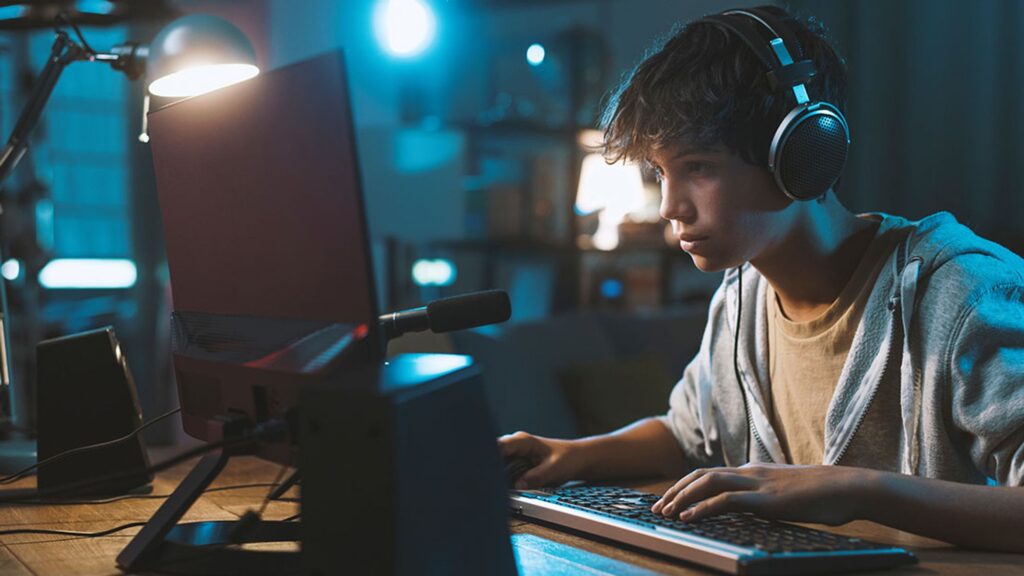
If you’re in the habit of relaxing with video games before bed — or it’s something you let your children do — it may be worth reconsidering that habit. “Unlike passive consumption of other media, video games demand active participation, which can significantly elevate mental arousal and affect sleep quality uniquely,” Dr. Holly Batchelder, a clinical psychologist, tells Sleepopolis. In other words, it may be winding you up instead of winding you down. Here’s what Batchelder and the latest research have to say about video games and sleep.
Long Story Short
- Video games are highly engaging and stimulating in nature, making them more likely to increase mental arousal and affect sleep quality.
- Evening gaming can negatively affect the natural sleep cycle by delaying sleep schedules and increasing exposure to blue light.
- The mental and physical stimulation of video games can lead to reduced sleep quality and insomnia.
- The key is moderation and balancing playing time with healthy sleep habits.
How Video Games Affect Sleep
You may be seated while you play, but video games are stimulating all the same. “Video games can stimulate the brain and increase emotional and physiological arousal,” explains Batchelder. That can be really disruptive to the natural sleep cycle in more ways than one — read on to find out more.
Delayed Sleep Schedule
Video games are inherently entertaining, and it’s easy to get caught up in the action. Research finds that video games are also generally a nighttime activity, which means you’re more likely to push off bedtime for a little extra playing time (1). That’s an issue because consistent bedtimes and wake ups are really important for supporting a healthy circadian rhythm. The body’s internal clock is pretty sensitive to disruptions, which means staying up late (not to mention all that light exposure) can really mess with your sleep patterns.
Poor Sleep Quality
If you do stay up past bedtime to play video games, you may find it hard to fall asleep when you finally climb into bed. According to Batchelder, video games can trigger emotional and physiological responses that leave you feeling wired even if you’re physically exhausted. Some research even suggests that video games played prior to bedtime are significantly associated with shorter sleep duration and a greater likelihood of reduced sleep quality, daytime sleepiness, and general sleep problems (2).
Physical and Mental Stimulation
Your fingers are flying, your eyes are glued to the screen, your heart is racing and you’re intensely focused on what’s happening right in front of you. In other words, you’re an active participant in the action. That may make your gaming more exciting, but it’s not a great recipe for falling asleep. “The mental and physical stimulation from gaming can keep the brain in a state of heightened alertness, making the transition to sleep more difficult,” explains Batchelder.
Blue Light Exposure
Whether you’re playing video games on a television or console, the device is emitting blue light — a no-no before bed. “Blue light exposure from screens can suppress melatonin, disrupting our natural sleep-wake cycles,” says Batchelder. In fact, studies show that using blue light-emitting devices within an hour before bed is associated with impaired sleep quality and duration (3). A review from 2022 explains why: Blue light exposure decreases tiredness and increases alertness (4). While that can be beneficial in some instances, it’s not ideal when bedtime is approaching.
Insomnia
All of the side effects of late-night gaming, from the delayed sleep schedule to the blue light exposure, can set you up for serious sleep issues. “They may lead to difficulty falling asleep, reduced sleep quality, and alterations in sleep patterns, which can contribute to insomnia,” says Batchelder.
Children, Teens, and Sleep
While adults can experience sleep issues as a result of video games, the risk may be higher for children and teens. “Children and teens are more vulnerable to sleep disruptions from video games due to their developing brains and greater sensitivity to the effects of blue light (5),” explains Batchelder. “Their sleep patterns are more easily disturbed, which can have cascading effects on mood and cognition.”
There’s research to support that, too. One study of 711 adolescents between 12 and 18 found that the use of gaming consoles were associated with a greater risk of insufficient sleep (6).
Video Games and Lucid Dreaming
Lucid dreaming is when someone is aware that they’re dreaming, and there’s some suggestion that playing certain video games may increase the likelihood of experiencing lucid dreams. One study conducted in 2019 found that playing physically interactive video games had a positive correlation with lucid dream frequency (6). Overall, the more participants played video games, the more they experienced lucid dreams.
“The immersive nature of video games could potentially prime the mind for lucid dreaming by enhancing the brain’s capacity for vivid, controlled dreaming,” notes Batchelder. “However, more empirical evidence is needed to draw firm conclusions.”
Sleep Tips for Gamers
Sleep should remain a priority, even for fans of video games. The key is balancing gaming time with healthy sleep habits.
- Turn the game off at least one hour before bedtime. According to Batchedler, that gives the brain sufficient time to shift from a high state of arousal to a relaxed state that’s better for falling asleep.
- Follow a consistent sleep-wake schedule. Sticking to a regular routine supports your internal clock and promotes a healthy sleep pattern. That means more restorative sleep.
- Skip the caffeine and energy drinks while you play. Caffeine is a stimulant that can keep you awake when it’s time to settle down for sleep. Generally, it takes about 10 hours to fully clear caffeine from your system, but that can vary depending on your age, gender, body weight, health conditions, and other factors.
- Practice proper sleep hygiene. Sleep hygiene refers to a set of actions and lifestyle habits designed to promote healthy sleep. In addition to a regular sleep and wake schedule, take steps to keep your bedroom cool, quiet and dark. Committing to regular exercise, limiting heavy meals late in the day, and avoiding naps are all research-backed items on the sleep hygiene checklist (7).
- Move the gaming console outside your bedroom. Reserving the bedroom for sleep and sex only is part of proper sleep hygiene, so consider moving your console if you keep it in your bedroom. This will help prevent your brain from building an association between mentally stimulating activities/wakefulness and your place of rest.
- Try blue light glasses while you play.
FAQs
How long before bed should I stop playing video games?
Batchelder advises patients to disengage from video games at least an hour before bedtime. “This buffer period can help the brain shift from a state of high arousal to a more relaxed state conducive to sleep,” she says.
Why do I fall asleep playing video games?
If you’re falling asleep while you play video games, you’re likely pretty tired. According to Batchelder, it could be an indication that you’re in need of more restorative sleep and more balanced gaming habits.
The Last Word From Sleepopolis
There’s ample evidence that playing video games, especially right before bed, can be highly disruptive to a good night’s sleep. Fortunately, you don’t have to give up gaming completely. Instead, be strategic about when you play and make sure you’re following healthy sleep habits to ensure that you’re getting the restorative rest you need. As Batchelder puts it, moderation is crucial, so make sure you’re being sensible about your gaming time.
Sources
Holly Batchelder. Personal interview. October 2024.
- Peracchia S, Curcio G. Exposure to video games: effects on sleep and on post-sleep cognitive abilities. A sistematic review of experimental evidences. Sleep Sci. 2018 Jul-Aug;11(4):302-314. doi: 10.5935/1984-0063.20180046. PMID: 30746049; PMCID: PMC6361300.
- Kristensen JH, Pallesen S, King DL, Hysing M, Erevik EK. Problematic Gaming and Sleep: A Systematic Review and Meta-Analysis. Front Psychiatry. 2021 Jun 7;12:675237. doi: 10.3389/fpsyt.2021.675237. PMID: 34163386; PMCID: PMC8216490.
- Silvani MI, Werder R, Perret C. The influence of blue light on sleep, performance and wellbeing in young adults: A systematic review. Front Physiol. 2022 Aug 16;13:943108. doi: 10.3389/fphys.2022.943108. PMID: 36051910; PMCID: PMC9424753.
- Silvani MI, Werder R, Perret C. The influence of blue light on sleep, performance and wellbeing in young adults: A systematic review. Front Physiol. 2022 Aug 16;13:943108. doi: 10.3389/fphys.2022.943108. PMID: 36051910; PMCID: PMC9424753.
- Lee SI, Matsumori K, Nishimura K, Nishimura Y, Ikeda Y, Eto T, Higuchi S. Melatonin suppression and sleepiness in children exposed to blue-enriched white LED lighting at night. Physiol Rep. 2018 Dec;6(24):e13942. doi: 10.14814/phy2.13942. PMID: 30556352; PMCID: PMC6295443.
- Sestir, M., Tai, M., and Peszka, J. (2019). Relationships between video game play factors and frequency of lucid and control dreaming experiences. Dreaming 29, 127–143. doi: 10.1037/drm0000102
- Pillion M, Gradisar M, Bartel K, Whittall H, Kahn M. What’s “app”-ning to adolescent sleep? Links between device, app use, and sleep outcomes. Sleep Med. 2022 Dec;100:174-182. doi: 10.1016/j.sleep.2022.08.004. Epub 2022 Aug 20. PMID: 36084495.
- Chen, Pao-Hui; Kuo, Hung-Yu; Chueh, Ke-Hsin. Sleep Hygiene Education: Efficacy on Sleep Quality in Working Women. Journal of Nursing Research 18(4):p 283-289, December 2010. | DOI: 10.1097/JNR.0b013e3181fbe3fd




























